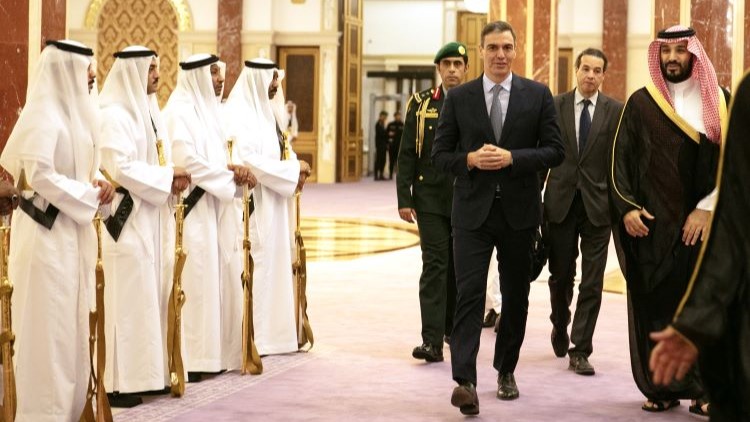Eduardo González
The President of the Government, Pedro Sánchez, warned yesterday in Jordan and Saudi Arabia of the need to avoid regional escalation of the Middle East conflict and praised, in this sense, Riyadh’s efforts to mediate between the different actors involved.
Pedro Sánchez began yesterday his second tour of the region since the escalation of the conflict, whose main objectives, according to sources from Moncloa, are support for a ceasefire in the Gaza Strip – a few days after the approval of a resolution of the UN Security Council in this sense – and the defense of the two-state solution, Israel and Palestine, that coexist in peace and security. The tour will conclude tomorrow in Qatar, where he will meet with the Prime Minister and Minister of Foreign Affairs, Mohamed bin Abdulrahman al Thani, and the Emir, Tamim bin Hamad al Thani.
The day began in Jordan, which was the first visit by a President of the Spanish Government to this country in fifteen years and where he was received at the Al Husseiniya Palace by the King of Jordan, Abdullah II. The Hashemite Monarch, who is especially involved in the search for a solution to the Middle East conflict, made a trip to Madrid last December in which he was received by King Felipe VI and the President of the Government and in which He thanked “Spain’s position” in the face of the conflict.
During yesterday’s meeting, as reported by Moncloa, the President of the Government assured that Spain supports the creation of maritime corridors for the shipment of humanitarian aid to Gaza and highlighted Spanish participation in the Jordanian mission to airdrop packages of humanitarian aid to the Gaza Strip in order to overcome the blockade that Israel maintains by land, to which Spain has contributed with the recent sending of two Air Force planes with a load of 24 tons of humanitarian aid and with the donation to Jordan of 110 parachutes to be used in air missions.
Sánchez and Abdalá II also exchanged views on the materialization of the two-state solution and on the need to avoid escalation and ensure stability in the region.
Pedro Sánchez also took advantage of his presence in Jordan to visit the Jabal Al Hussein refugee camp, managed by the United Nations Agency for Palestine Refugees in the Middle East (UNRWA), where he was received by the Deputy Commissioner General of the Agency, Natalie Boucly, and by the director of the Office in Jordan, Olaf Becker. The camp, which was created in 1952, today hosts more than 30,000 Palestinian refugees.
During the visit, the Head of the Executive reiterated Spain’s support for the work of UNRWA and stressed the importance of the international community maintaining adequate funding for the Agency. “Spain is willing to lead by example,” he assured, referring to the double contribution of 3.5 million euros recently announced by the Government despite the decision of a group of countries to freeze their contributions after a dozen of agency employees (out of a workforce of 30,000) have been accused of having participated in the Hamas attacks of October 7.
Finally, Pedro Sánchez visited the Citadel of Amman, one of the most important archaeological sites in Jordan and which was rebuilt, in part, with the help of Spanish cooperation, which since the mid-90s and for more than two decades has participated in excavation, research and restoration projects with the help of the Spanish Archaeological Mission.
Riyadh
In the afternoon, the President of the Government traveled to Jeddah, in Saudi Arabia, where he held a meeting with the Prime Minister and Crown Prince, Mohammed bin Salman. During the meeting, both leaders agreed on the need for the international community to redouble its efforts to end the crisis through two means: the materialization of the ceasefire demanded by the United Nations Security Council and ensuring the access of humanitarian aid.
Likewise, the President of the Government exchanged views with the Prime Minister of Saudi Arabia on the search for a political solution to end the conflict and move towards the implementation of the two-state solution. Moncloa sources indicated this past Monday that one of Sánchez’s objectives in Riyadh was to address with his Saudi counterpart the recognition of the State of Israel by the Arab countries, something that Saudi Arabia has not yet done. However, Moncloa’s press release made no reference to this matter.
Regarding the regional escalation of the conflict, both leaders shared their concern about the threats that it would pose to global stability and security and, in this sense, the President of the Government positively valued the efforts that Saudi Arabia is carrying out to mediate between the different actors involved.
Changing the subject, Pedro Sánchez and Bin Salman agreed to create a structured framework for economic cooperation between both governments for the identification and execution of investment opportunities.
Precisely, the President of the Government also held an informal meeting with several representatives of Spanish companies with the aim of listening to their concerns and interests and their possible investment plans in the country and to which he highlighted the opportunity presented by the economic diversification strategy that The Saudi Government follows through the so-called Vision 2030, which foresees large infrastructure programs in sectors such as energy, transport, tourism or water in which Spanish companies are world leaders.






